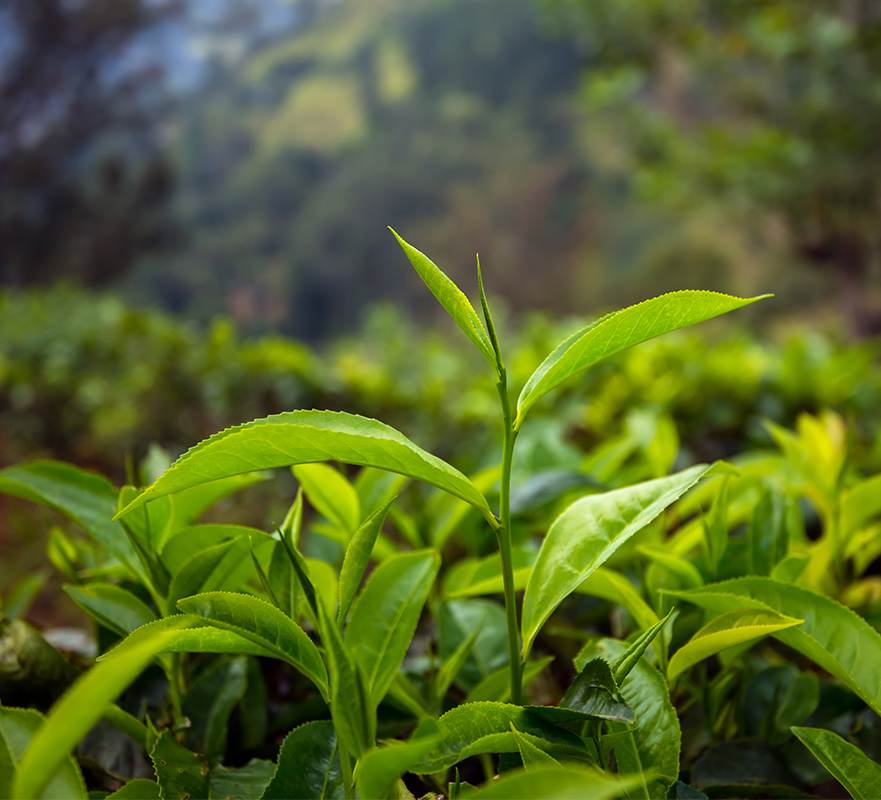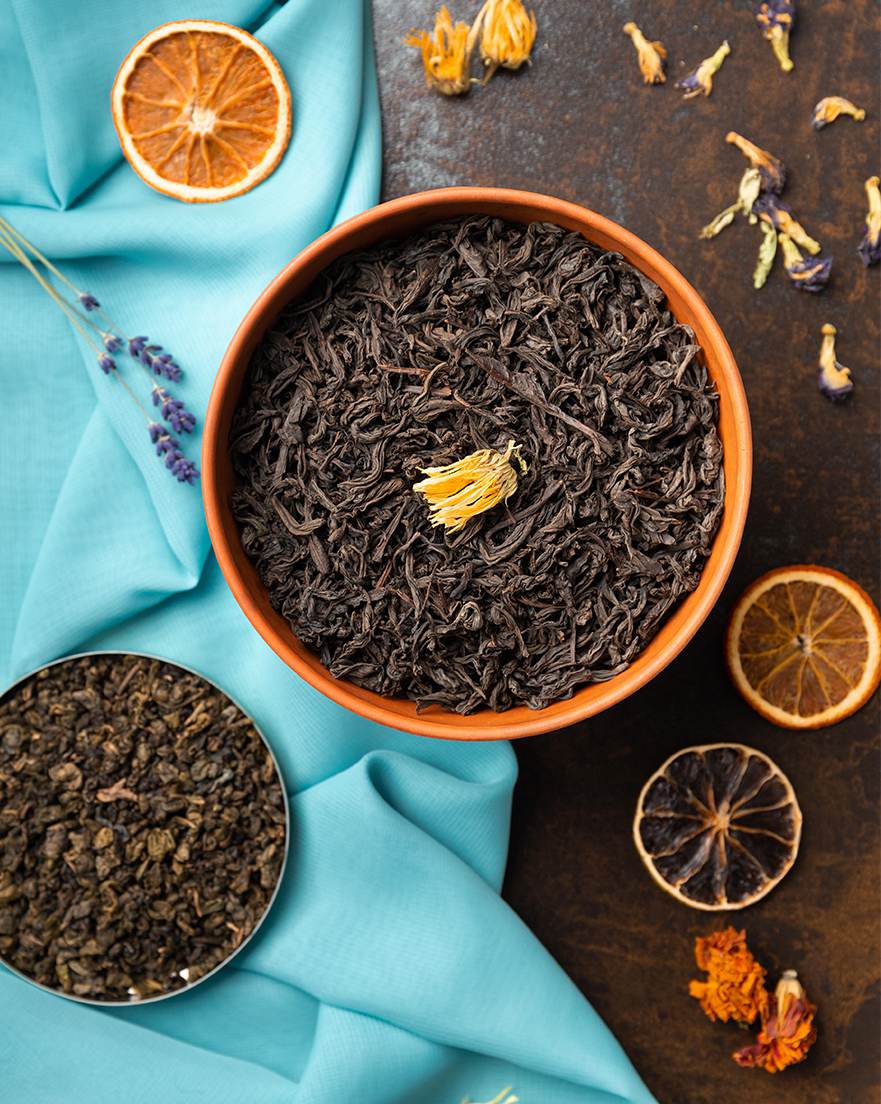Aromatic and very mild Chinese tea. Light and refreshing.
Discover our other teas:
Discover the captivating world of black tea, a sensory journey that begins in the lush gardens of China and India. Renowned for its copper color and intense aromas, this tea from Camellia sinensis is distinguished by its complete oxidation process. From harvest to cup, each step of production is a tribute to tradition and quality. Imagine a hot infusion with fruity notes of Yunnan, a flavor-rich Ceylon black tea, or a delicately floral Darjeeling. Each sachet contains a cargo of benefits, from energizing theine to antioxidant tannins, perfect for your health. Whether plain or subtly flavored with vanilla, rose, or cinnamon, black tea offers an infinite range of tastes and virtues. Join us to discover the secrets of this millennial beverage, appreciated by connoisseurs for its depth and complexity.

Black tea, derived from Camellia sinensis, is the result of a complete oxidation process of tea leaves. This unique method gives the beverage its characteristic copper color and full-bodied flavor that has conquered the world. Unlike green tea or white tea, black tea undergoes prolonged fermentation, thus releasing the full richness of its aromas.
Although China is the ancestral birthplace of tea, black tea only appeared in the 17th century. Its creation marks a turning point in the history of this millennial beverage. It quickly established itself as the favorite among Westerners, particularly thanks to its ability to maintain its taste qualities during long sea cargo voyages.

China, the birthplace of black tea, offers an unparalleled range of flavors. Yunnan, known for its honey-like notes, and Lapsang Souchong, famous for its smoky taste, illustrate the diversity of Chinese black teas. These unique creations are the result of centuries of expertise and traditions.
A giant in black tea production, distinguished by two iconic regions: Darjeeling, often called the "champagne of teas" for its delicacy, and Assam, known for its strength and malty character. These Indian teas have conquered palates worldwide thanks to their exceptional quality.
| Variety | Region | Characteristics |
|---|---|---|
| Darjeeling | West Bengal | Light, floral, muscatel notes |
| Assam | Assam | Full-bodied, malty, robust |
Ceylon teas, produced in Sri Lanka, are renowned for their brisk and slightly astringent flavor. Orange Pekoe, a superior quality grade, is particularly prized by tea enthusiasts for its freshness and balance.
Generally, it is considered that about 2 grams of loose tea are needed to prepare a cup of 10 to 15 cL. This amount also corresponds to the quantity present in individual tea bags or pods. It is then recommended to consume a maximum of 5 cups of tea per day, which is equivalent to about ten grams of tea daily.
Black tea distinguishes itself from white tea, green tea, and oolong tea by its higher theine content. This means that a cup of black tea has more stimulating or even exciting properties than other types of tea. However, keep in mind that the recommendations to drink up to 5 teas daily also apply to (and especially!) black tea: in other words, you can enjoy 1 to 5 cup(s) of this brewed beverage per day without experiencing side effects related to overconsumption of theine, such as difficulty concentrating, sleep disturbances, or increased irritability.
For optimal management of your black tea consumption, our team recommends planning your hot beverages as follows:
Are you prone to anemia or iron deficiencies? In this case, avoid drinking tea at the table and within 2 hours after your meals for better iron absorption by your body. Finally, if you are pregnant, it's preferable to limit yourself to 3 cups of black tea daily.
Although derived from the same plant, black tea and green tea differ considerably:
Alternating between black tea and green tea allows you to benefit from the specific advantages of each variety. This balanced approach not only enriches your taste palette but also optimizes the health benefits.
The production of black tea follows a meticulous process, known as the orthodox method:
The main black tea producing regions are distinguished by their unique terroirs:
Whether you're a seasoned enthusiast or a curious novice, the world of black tea invites you on a sensory journey rich in discoveries. From the first morning sip to contemplative tasting, each cup tells a story of terroir, tradition, and craftsmanship. Dive into this fascinating universe and let yourself be seduced by the richness of black teas from around the world.
Preparing black tea is an art that deserves attention. To extract all the richness of its aromas, follow these essential steps:
Rinsing the leaves, although less common for black tea than for oolong tea, can improve the purity of taste. This practice involves quickly pouring hot water over the leaves before the main infusion, thus removing dust and opening the leaves for better release of aromas.
Black tea, beyond its captivating taste, is a valuable source of health benefits. Rich in antioxidants, particularly flavonoids, it contributes to cellular protection and general well-being.
| Benefit | Description |
|---|---|
| Cardiovascular health | Improves blood circulation and reduces the risk of heart diseases |
| Digestion | Stimulates the digestive system and can help reduce bloating |
| Energy | Theine provides a sustained energy boost without the side effects of coffee |
| Bone health | May help strengthen bone density |
Although black tea is generally beneficial, excessive consumption can lead to undesirable effects. The caffeine it contains can cause insomnia, anxiety, or digestive issues in sensitive individuals. It is recommended not to exceed 3 to 5 cups per day and to avoid consumption in the evening.
Black tea tasting is a complete sensory experience. To fully appreciate its nuances, follow this tasting guide:
The world of flavored black teas offers an infinity of flavors for all palates: